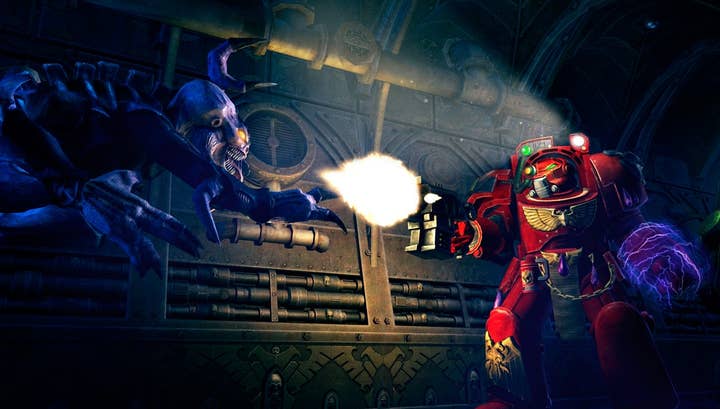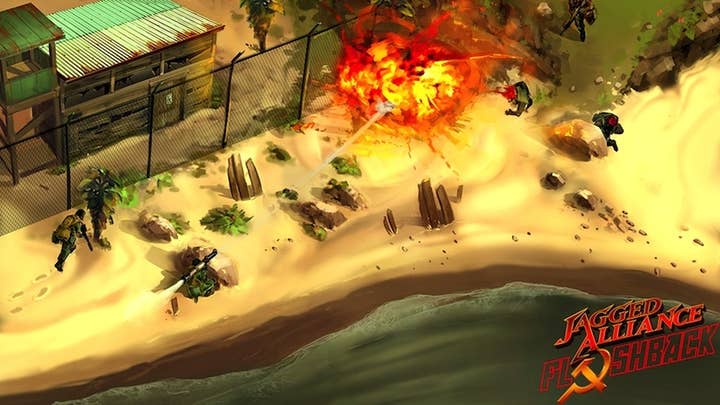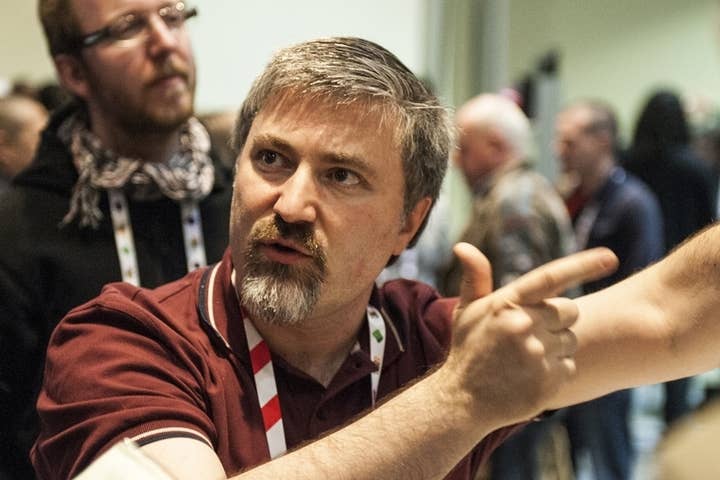Full Control: Happy Accidents And Harsh Realities
Thomas Lund details Space Hulk's charmed inception and Jagged Alliance's troublesome Kickstarter
Thomas Lund calls it, "one of those GDC moments." The sort of impossibly precise good fortune that shouldn't happen in a city crammed full of other developers on the hunt for deals. Until, that is, it does happen, and it happens to you.
It was a cold March morning in San Francisco, probably the only part of California where such a climate is even possible at that time of year. Lund, the CEO of the indie developer Full Control, was warming his hands by the open-fire of a plush downtown hotel, passing the time before his next meeting, just one of dozens scheduled over the course of GDC week.
"For companies of our size, these sort of licenses don't often come around. We have to execute on this"
On this particular morning, the warmth of the fire had attracted another man: an older gentleman, sharply dressed with a British accent. Striking up a half-hearted conversation, Lund outlined Full Control's focus on adapting table-top games to the new, digital platforms that had galvanised the indie development scene. The gentleman responded with weary good cheer. He knew a lot about board-games. Indeed, he had thousands stacked in his basement that he could never quite bring himself to abandon.
"So we keep talking, and I start to explain how fantastic a game based on Space Hulk would be to make," Lund says, an element of surprise in his voice even a year after the fact. "That would be my dream project. A minute later, he gave me his card"
It was a lightning bolt: Ian Livingstone, OBE, life president of Eidos, co-founder of Games Workshop, and the rest.
"I was dumbstruck," says Lund.
A GDC moment. Trips to the United Kingdom, pitch meetings and an enthusiastic partnership with Games Workshop soon followed, and within months Lund's dream project was a reality. That chance meeting with Livingstone set things in motion with a speed that Lund had previously thought impossible. And there was another factor at play: the calamity occurring at THQ, which held the 40k license, and had stood in the way of Lund's attempts to develop a Space Hulk game in the past. Now, as THQ was succumbing to the very factors that had facilitated the rise of companies like Full Control, it's imminent demise became the ultimate bargaining chip.

"THQ was on the way down, and Games Workshop was taking back the license for 40k," he says. "They were looking at licensing in a different way. Instead of selling it as one big chunk to a huge publisher or developer, they wanted to let it out in smaller pieces to fan-based studios. Looking at what they've done now, with some of the deals they've made, if you're a 40k fan you'll be catered to much better with smaller games that are more true to what 40k is.
"For example, with Space Hulk, I'd been trying to pitch that idea THQ for the last two or three years...but they simply ignored me. I tried Linkedin, I tried direct, I tried to hit them up at various conferences, but I was ignored.
"The industry has now opened up for much more niche games. My production costs for Space Hulk are way, way less than what THQ would have spent, even on a similar sized team."
"I'd been trying to pitch that idea THQ for the last two or three years...but they simply ignored me. I tried Linkedin, I tried direct, I tried to hit them up at various conferences, but I was ignored"
Space Hulk is one of two classic IPs with which Full Control is working, the other being a new version the tactical RPG Jagged Alliance - not bad for a young studio with a team of twelve, but Lund believes it is a vindication of the company's principles. From the very beginning, Lund wanted to avoid "selling our souls" by taking VC investment, saddling the company with the sort of scale and expectations that could jeopardise its long-term survival. Instead, Full Control measured its ambitions, starting with small games on iOS, then refining its engine and expanding its budget and vision with each new release.
A downside of that cautious approach is a sense of suspicion from the die-hards in the Space Hulk and Jagged Alliance communities - "They're looking at us and saying that we've only made small games: 'Why should I trust you to do a big game like Jagged Alliance?'" - but Lund doesn't seem concerned. This is the best-case-scenario outcome of the philosophy that has guided Full Control since its inception, and that philosophy was created to ensure that it would be ready for the challenge should it ever arrive.
"Yes, We are a small studio. We've never taken publisher money to make something that people know and will play anyway, and there's a reason for that," he says. "If we'd have gone down that route, we'd never have been able to make Space Hulk and Jagged Alliance. We're a fan studio. We only make games that we believe in, and in the way we want to make them.
"For companies of our size, these sort of licenses don't often come around. We have to execute on this. If we do it right and we get a nice return, we could keep on doing projects like this forever. You just have to take your chances when they're there."
And the evidence is there for all to see. Of the two projects, the self-funded Space Hulk is much closer to completion, and the gameplay footage released at GDC this year is enough to gladden the heart of anyone who played the tabletop game in its pomp - a potent mixture of faithful recreation and the sort of visual effects and cinematic trickery that gave Firaxis' Xcom: Enemy Unknown such vitality. Space Hulk will not pull its punches, Lund assures me. Your soldiers will die brutally and often.
And for the most part the press has responded positively - the result of a concerted effort on the part of Full Control that Lund compares to creating the actual game.

"Making the game is only half the job," he says. "You can make the world's best game, but if nobody is able to find it then you can't sustain your business... And you can ask me stuff that would be impossible to ask a company like EA and get a straight answer for. Building those relationships over time is fantastic for us, and we can get much better press coverage than the canned previews that some companies put out there. It means our fans and our players get to read better quality, more insightful interviews, and the content we put out will reflect that."
But the future of Jagged Alliance: Flashback is less assured. For that project, Full Control opted to start a Kickstarter campaign with a target of $350,000 - not a fortune, exactly, but with 3 days to go the game is still $100,000 short of reaching that goal. At several points during our conversation, Lund mentions that Full Control's low-profile has elicited pessimism from the usual vocal minority on its ability to do right by such a storied IP, but he also suspects that the public attitude towards Kickstarter has changed.
"If you're thinking about running your own IP on Kickstarter I don't think you should do it. It's a waste of time and effort"
Would Jagged Alliance have waltzed past its goal in the glory days of Double Fine Adventure and Wasteland 2? It's hard to say, but there can be no doubt that realising a successful Kickstarter campaign is now much more like hard-work. With so many developers turning to crowd-funding, and the press getting cold-feet about all of the campaigns they effectively endorsed that have yet to bear fruit, Kickstarter has lost much of its power as a marketing tool.
For both press and public, there are simply too many places to look. The market has been split in a hundred different ways, and only the big names stand a chance of making it work.
"It's people's money, and they should feel confident about what they're putting their money towards," says Lund. "There are people who put $500 or $1000 on the table and say, yes, I believe in the product that you are going to make. You have to earn that in some way.
"Now, you have to prove that you're a real studio, earn that trust, and show that you have really good ideas about what you want to do. I hope that we've done that.
"But if you're thinking about running your own IP on Kickstarter I don't think you should do it. It's a waste of time and effort. It's almost impossible to get the traction for even something like Jagged Alliance. So doing that on your own IP, with no big names backing you? I wouldn't do that. I would seek funding in other ways."

